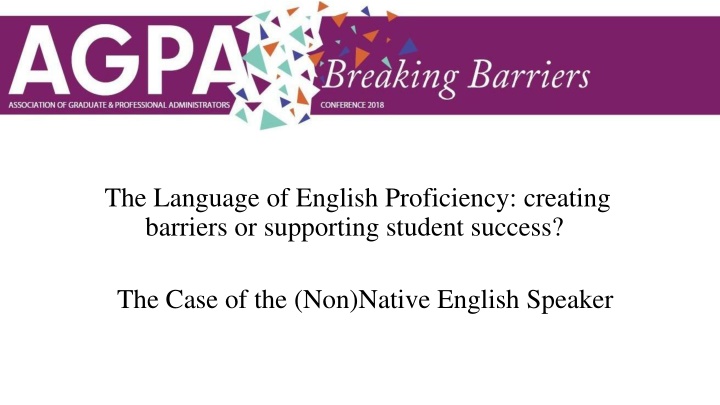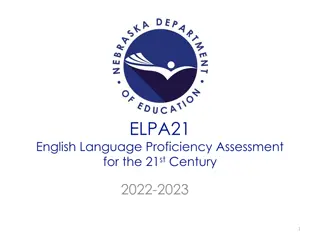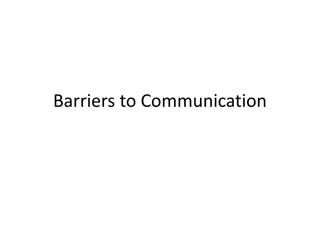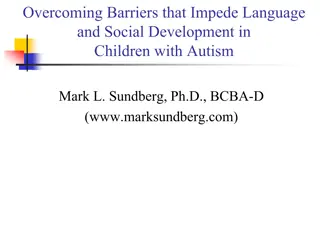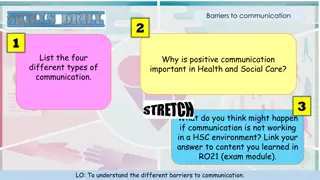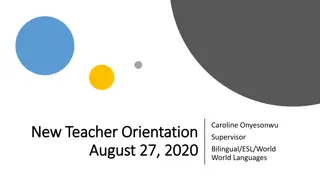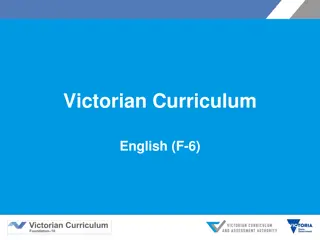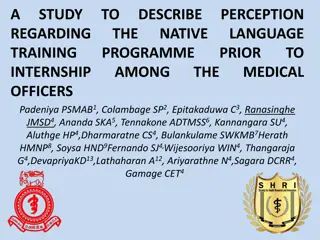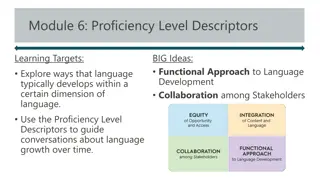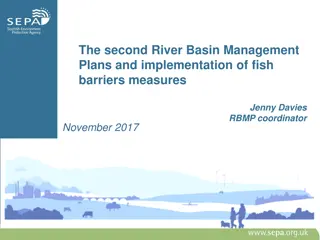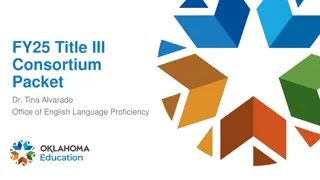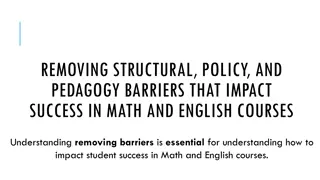The Language of English Proficiency: Barriers or Support for Student Success?
Creating a dialogue on the language used by higher education institutions regarding English proficiency, focusing on interpreting applicants' responses and reconsidering assumptions. The case study of Ohio University Graduate College explores how institutions assess and support non-native English speakers.
Download Presentation

Please find below an Image/Link to download the presentation.
The content on the website is provided AS IS for your information and personal use only. It may not be sold, licensed, or shared on other websites without obtaining consent from the author.If you encounter any issues during the download, it is possible that the publisher has removed the file from their server.
You are allowed to download the files provided on this website for personal or commercial use, subject to the condition that they are used lawfully. All files are the property of their respective owners.
The content on the website is provided AS IS for your information and personal use only. It may not be sold, licensed, or shared on other websites without obtaining consent from the author.
E N D
Presentation Transcript
The Language of English Proficiency: creating barriers or supporting student success? The Case of the (Non)Native English Speaker
Presenters Katie Tadlock, Ph.D. Assistant Dean, Graduate College Ohio University Andy Ray, Ph.D. Director, Intl. Student Services, Graduate College Ohio University
Purpose: Discuss the language higher education institutions (HEIs) use on their application and websites to generate a response from international graduate applicants about their English proficiency level. Then, ask how do HEIs interpret the applicants response to that question? Are students from certain countries automatically considered to be native English speakers? Which countries are on the list and which are not, and why? The aim of the presentation, then, is to inspire an on-going dialogue on this topic, so that higher education institutions in Ohio can break barriers in how we think about English proficiency, all the while upholding the Ohio Revised Code 33.45.281, and fostering student success. As speakers of world English become ubiquitous to Ohio institutions, the way in which we define and determine English proficiency will also adapt.
Ohio Revised Code 3345.281: Program to assess oral English language proficiency of teaching assistants providing classroom instruction As used in this section, teaching assistant means a student enrolled full-time or part-time in a graduate degree program at an educational institution for which the student has received an appointment to provide classroom-related services. The board of trustees of each state university, medical university, technical college, state community college, community college, and the board of trustees or managing authority of each university branch shall establish a program to assess the oral English language proficiency of all teaching assistants providing classroom instruction to students and shall ensure that teaching assistants who are not orally proficient in the English language attain such proficiency prior to providing classroom instruction to students. Amended by 129th General AssemblyFile No.18, HB 139, 1, eff. 4/29/2011. Effective Date: 07-24-1986.
Ohio Universitys Graduate Catalog states: The language of instruction at Ohio University is English. Therefore, proficiency in reading, writing, speaking, and understanding English at an advanced academic level is essential to academic success. Applicants for whom English is not a native language are required to provide an official score report of one of two standardized tests: the Test of English as a Foreign Language (TOEFL) or the International English Language Testing System (IELTS academic) . Applicants who wish to be considered for teaching appointments are advised to submit iBT TOEFL scores with the speaking test component.
Ohio Universitys 2018- 2019 graduate application
Ohio Universitys 2019-2020 graduation application The language of instruction at Ohio University is English. Proficiency in reading, writing, speaking, and understanding English at an advanced academic level is essential to academic success. Native language(s): [drop down list of languages] Native language is defined as the primary language used with your family growing up and/or the primary language used in your secondary and university-level education. Fluency is defined as high proficiency in a language acquired through instruction and not used as a primary language in the home or for instruction in most academic subjects. Note: You may be fluent in languages that are not your native language. *If applicant does not select English, then a new pop-up should appear: Applicants for whom English is not a native language are required to provide an official score report of one of two standardized tests: the Test of English as a Foreign Language (TOEFL) or the International English Language Testing System (IELTS academic).
So what are we asking of our students on the application? What are the implications of those questions?
Spoken English intelligibility and comprehension: whose job is it anyway? Speaker? Listener? Everyone?
Standard English (S.E.) speaker versus World English (W.E.) speaker S.E. Proficiency Measured in terms of the native speaker, which is a monolingual speaker from the homogenous inner-circle speech communities, such as the U.S.A., Australia, and Great Britain. W.E. Proficiency The ability to engage in meaningful social and institutional functions in multilingual communities according to local conventions. How do the shifts in understanding English proficiency affect our message to students and our interpretation of their answer? There is nothing called a general or universal proficiency anymore (Canagarajah, 239).
Example university not in Ohio (https://theconnection.ece.org/MessageBoard/ViewTopic/1616) we would require the applicant to submit proof of English proficiency because Nigeria is not on our Board of Regents-approved English proficiency exempt list. This is the list and our exceptions: All international applicants must provide proof of English proficiency before their applications can be considered for admission. This test is waived only for graduates of U.S. universities or universities in English proficiency-exempt countries. Applicants who have completed at least two consecutive years at a college or university in the U.S. or in an English proficiency-exempt country are also exempted from the English proficiency requirements. [Our university] considers the following countries to have English as their native language: Australia, Canada (except the Province of Qu bec), Commonwealth Caribbean countries (Anguilla, Antigua, the Bahamas, Barbados, Belize, British Virgin Islands, Bermuda, Cayman Islands, Dominica, Grenada, Guyana, Jamaica, Montserrat, St. Kitts and Nevis, St. Lucia, St. Vincent, Trinidad and Tobago, and Turks and Caicos Islands), Ireland, Liberia, New Zealand, United Kingdom (England, Northern Ireland, Scotland, and Wales), and the United States. This is from our graduate catalog, but we also add the following exemptions for undergraduate applicants: completion of secondary school in the US or a country on the English proficiency exempt list, completion of the IB diploma, scores of 500 on EACH section of the Critical Reading and Writing portions of the SAT exam, or a grade of C or higher on the GCSE/IGCSE.
So is a native language the same as a national language? Example: Ghana What differences might there be? Example: Ghana, Scotland
Thank you! Katie Tadlock, Ph.D. Assistant Dean, Graduate College Ohio University: tadlockk@ohio.edu Andy Ray, Ph.D. Director, Intl. Student Services, Graduate College Ohio University: raya@ohio.edu
